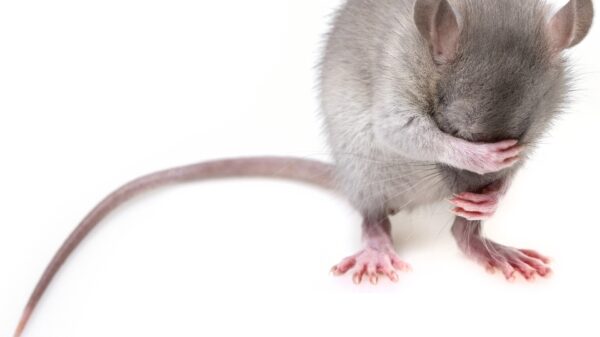When pregnant women use cannabis they could be putting their daughters at a higher risk of developing metabolic syndrome in middle age, which includes diabetes, cardiovascular disease and obesity.
A recent study published in the Reproductive Toxicology journal tested what happens to the pancreas of baby rats if their mothers were given THC while pregnant.
The study found that the rats’ female offspring had lower levels of critical beta cells in their pancreas needed to regulate blood sugar levels, compared to their sober counterparts. The missing cells mean the rats would struggle to control and produce insulin in their bodies, which can lead to glucose intolerance — one of the main causes of type 2 diabetes.
The study found this in female rats, but not male.
That’s not to say that smoking weed will give your daughter diabetes, but it does suggest that it could put them at a higher risk of developing glucose intolerance, study author Daniel Hardy said.
Hardy is an associate professor at Western University and a scientist with the Children’s Health Research Institute.
Researching what cannabis does to unborn babies is very important, because surveys have found that around 7 per cent of pregnant women use cannabis in North America, according to the study. Cannabinoid potency has also skyrocketed since 1995, moving from 4 per cent to 12 per cent on average, the study says.
A dearth of research on how cannabis use during pregnancy affects offspring’s metabolism in the long term could mean children are being put in harms way, Hardy said.
Previous study found THC causes underdeveloped rat offspring
These results follow some of Hardy’s previous research that found using THC while pregnant can lead to underweight babies.
Read more: Pregnant women who use cannabis daily put their babies at risk: study
The joint study from Queen’s University and Western University found daily THC exposure led to baby rats being born with low birth weights, and less developed brains and livers. Three weeks after birth, the rats had fully recovered to a normal size, but that rapid chunk of growth can lead to dangerous health disorders later in life, according to the research.
Some of those disorders include type 2 diabetes and obesity.
The most recent study looked at how well those underweight rats could regulate their blood sugar when they grew up.
“This study is looking at the long-term effects of the offspring. These are animal, not human studies. But what this really says is we should be keeping an eye on children whose mother used cannabis during pregnancy; And follow up as they get older to see if they develop glucose intolerance and perhaps early symptoms of type 2 diabetes,” Hardy said.
To test this, researchers gave pregnant rats a daily dose of three milligrams of THC per kilogram of body weight, which is comparable to how much a moderate smoker would consume daily.
They later tested how five-month-old offspring responded to a glucose tolerance test, which is the same test given to humans. It found that females failed, but not males.
That doesn’t mean male rats are out of the woods, Hardy said. Five-month-old rats are comparable to 30 to 40-year-old humans, so they still could develop health issues later in life, he added.
Impaired glucose tolerance puts you at a higher risk for metabolic syndrome, which includes type 2 diabetes, obesity and cardiovascular issues.
Read more: Stoner rat study first to closely mimic THC affinity in humans

On the left is the pancreas of a normal five-month-old female rat offspring. The brown staining indicates the number of pancreatic beta cells, which produce insulin and help maintain glucose tolerance. On the right is the pancreas of a five-month-old female rat offspring exposed to THC in utero, with far less pancreatic beta cells. Submitted photo from the study
By three-weeks-old, which is comparable to an adolescent human, the rats have a lack of pancreatic beta cells needed to produce and regulate insulin in the body. By five months, the rats fail the glucose tolerance test.
“We need to follow up on these animals. We looked at them at five months, so we need to look at them a bit older because that would resemble more of a middle-to-late stage human,” he said.
Researchers aren’t sure why female, not male, rats are affected by THC exposure
This isn’t the first study that suggests female offspring are more vulnerable to the adverse effects of THC in utero. In a behavioural study, researchers found female THC-exposed offspring were more susceptible to opioid addiction, compared to their male siblings, Hardy said.
The researchers aren’t quite sure why females are more impacted by THC. Hardy said they tested to see if it was related to the hormones estrogen or testosterone and found it wasn’t.
Right now they think it might be epigenetics, which is when biological mechanisms turn things on or off in a DNA strand.
“These modifications do not change the DNA sequence, but instead they affect how cells ‘read’ genes. In other words, epigenetics is something that we do not have in our genes, and we can still pass on to our children,” Hardy said.
Which raises the next question: Can exposing a pregnant rat THC lead to glucose intolerance in its grand-babies?
Certain drugs, like nicotine, are already known to have cross-generational effects.
“It’s not just what your mother did in pregnancy; it could also be what your grandmother did in pregnancy as well,” he said.
A lot more research needs to be done to better understand the full impacts of THC during pregnancy, Hardy says.
Following the January study that found THC-exposure leads to underdeveloped babies, Hardy is currently working on studies that look at how the brains and livers of these affected offspring develop.
Hardy says his team will also be looking at how exposure to CBD, with and without THC, affects development. And, following up on the most recent study, they’ll be looking at if there are cross-generational effects of major cannabinoid exposure on glucose intolerance.
Top image via Deposit Photos
michelle@mugglehead.com
@missmishelle














